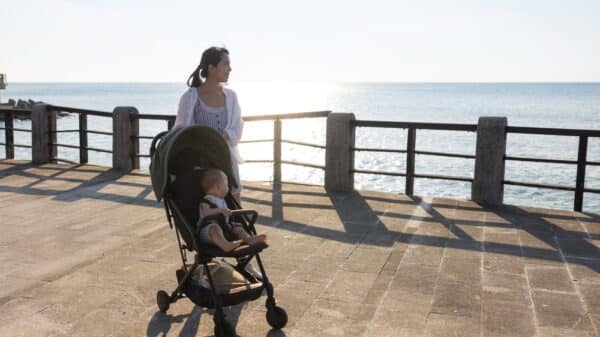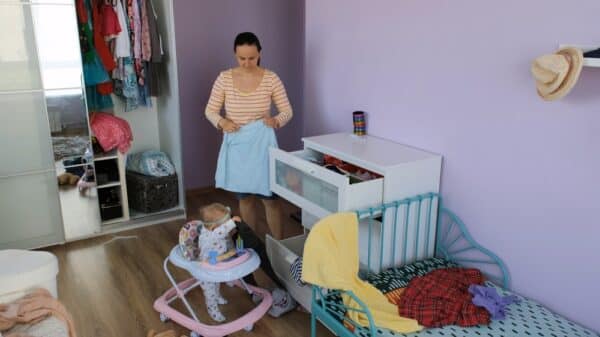The summer holiday continues, but worries about the next school year might already be setting in. Whether your child is preparing for their very first day of school, moving up a grade, or changing schools altogether, adjustments to their daily routine can be a source of anxiety for many children. Dr. Ranj, a pediatrician, TV personality, and author, offers advice on how to help children cope with these feelings and points out signs that may indicate their apprehension about returning to school, such as episodes of bedwetting.
How common is back-to-school stress?
Dr. Ranj explains, “It’s safe to say that pretty much every child experiences some level of anxiety when it comes to the school environment at some point. This reaction is almost universal among children. Walking into school for the first time can be a really daunting experience.”
Can anxiety about school cause an increase in bedwetting?
A recent study by Pampers Ninjamas found that parents of children who wet the bed indicated that changes in routine (62%), nerves (56%), or excitement (35%) related to starting or returning to school can increase the likelihood of bedwetting.
Dr. Ranj notes, “We acknowledge that any life transition can lead to various positive changes,” but he cautions, “unfortunately, it can also result in negative outcomes, bedwetting being one of them.” He observes, “Bedwetting is a common and normal part of growing up, but the stress of going back to school can amplify its frequency.”
A survey conducted among 1,000 caregivers of children aged 4-7 revealed that 49% saw more incidents of bedwetting at the start of the school year than at other times.
Is there a difference in bedwetting rates between genders?
According to Dr. Ranj, “Bedwetting is generally more common in boys for unknown reasons. Still, it’s a shared experience for many children at some point.”
Should parents be concerned about bedwetting?
ERIC, a charity focused on children’s bowel and bladder health, estimates that 15% of 7-year-olds regularly wet the bed, which is significant. Dr. Ranj clarifies that “Bedwetting is especially prevalent in children under 5, as they are still learning bladder control. For this age group, it’s typically part of their development.” However, he emphasizes that “after the age of 5, healthcare providers take this seriously, and according to NICE guidelines, if a child over 5 experiences persistent or recurrent bedwetting after being dry, medical consultation is advisable to rule out any underlying health issues. In most situations, there aren’t any, and there are many strategies available to manage the impact of bedwetting, including using products like Ninjamas to help navigate this phase.”
How does bedwetting affect children as they return to or start school?
If bedwetting is triggered by anxiety about starting school, it can damage self-esteem, particularly in older children. Dr. Ranj reports that “one-third of parents noted that if their child wet the bed the night before, they were less enthusiastic about going to school the following day.” He also highlights that bedwetting affects the confidence of about 75% of children. “As they grow older, they may become increasingly self-conscious about bedwetting, which can affect their self-esteem, academic performance, and willingness to go to school,” he adds.
Signs that a child may be experiencing school-related anxiety
The recent Pampers study showed that concerning the return or beginning of school, 64% of children primarily worry about being separated from their parents or caregivers, 55% are apprehensive about following teacher directions, and 60% feel nervous about meeting new classmates.
Bedwetting can be a strong indicator of underlying anxiety in children, but other, more subtle changes may also be observed. Dr. Ranj advises that “changes in behavior, increased defiance, sleep disturbances, and changes in appetite may signal stress.” He emphasizes that “various forms of stress can affect sleep, eating habits, and behavior.”
Strategies for helping children prepare for school
Dr. Ranj emphasizes that “the first step is to talk. Have open conversations. It won’t just be a one-off discussion; you’ll need to revisit these topics several times.” He encourages parents to “create an environment where your child feels safe to express any concerns they have without fearing criticism or reprimand. Allow them to share their worries freely, and often, you can tackle these issues early on.”
If your child does not seem anxious about a specific issue that relates to school, Dr. Ranj still recommends “creating that safe space and checking in with them to see how they’re feeling. Are there any worries on their mind? That’s a great starting point.”
Finding the right time to talk is also important. Dr. Ranj suggests “using the moments during school pick-up or drop-off to engage in these discussions. The ride home can be an ideal time to chat.” Additionally, books and TV shows can serve as excellent conversation starters. Dr. Ranj points out, “if you come across a story online or on television, these can be great triggers to initiate important conversations.”
Above all, Dr. Ranj stresses, “it’s about making sure your child feels secure and knows they can confide in you without worry of reproach, as that often prevents open communication. Parents don’t need to be therapists, but meaningful dialogue can lead to positive outcomes.” Regarding bedwetting, regardless of whether the issue is school-related, he encourages parents to reassure their children that accidents are common and should not be a source of shame or embarrassment. “You can work through it together. Most children will get past it. Encourage their confidence that the situation will improve and isn’t permanent.”
How to effectively initiate conversations
Having discussions with children and cultivating a space for open communication is vital, but how can you start those dialogues, especially with older kids who might prefer privacy? Dr. Ranj recommends asking questions, substituting “worry” with “sadness,” and asking, “what made you sad?” He also suggests beginning with positive topics. Ask them about enjoyable moments and what makes them happy, followed by inquiries about sources of sadness. Tailor your approach based on your child’s age, and parents should strive to remain non-judgmental, particularly when discussing bedwetting. Always reassure your child that it is normal, they will improve, and you can find solutions together. Additionally, Dr. Ranj suggests rewarding dry nights and involving them in changing wet bedding, offering them incentives for their help. The NHS also supports “implementing rewards for positive behaviors, such as a sticker each time they use the toilet before bedtime.”
Is it appropriate for older children to wear diapers for bedwetting?
Bedwetting can be both distressing and embarrassing. To help alleviate its impact and ensure your child feels secure at school, introducing nighttime diapers like pull-up pants designed for older kids can be a helpful strategy. Dr. Ranj endorses Pampers Ninjamas, stating, “they don’t look like typical pull-up pants, offering discretion.” He suggests avoiding the term “diapers,” instead referring to them as special garments or something similar. Ninjamas are designed for children up to age 12 and are created to avoid the appearance or feel of traditional diapers, so children can wear them without feeling awkward or different.them.” However, he emphasizes that “they are not a long-term solution for bedwetting; it’s essential to keep that in mind. They act as a resource to manage the situation and help children avoid feelings of shame.” These tools help alleviate discomfort, as waking up in a chilly, wet bed is unpleasant for anyone. Dr. Ranj points out, “the reassurance provided by these products can sometimes boost confidence, particularly when children are away from home.”
The Journal for Enhancing Confidence as Kids Return to School
As summer draws to a close, if you notice your child feeling anxious or expressing concerns, such as bedwetting, a journal can be extremely beneficial. Pampers Ninjamas has launched a campaign titled “Back to School with a Boost,” offering parents a chance to acquire a free journal that helps build confidence, designed for 4-7-year-olds by child psychologist Dr. Kimberley Bennett. Dr. Bennett states, “Addressing bedwetting can be a delicate issue, and this journal provides a useful tool for facilitating meaningful conversations around feelings.”
Dr. Ranj commends the journal for its variety of activities designed for different age groups. He highlights its role in helping children navigate their emotions, tackle challenges, and celebrate their successes in a fun and engaging way.
This complimentary journal delivers guidance for parents, creative activities for children, and helps prepare them for the transition back to school. Dr. Ranj highlights the significance of resources like this in fostering children’s mental well-being, especially regarding bedwetting, advocating for its inclusive and hands-on approach.
A Guide to Introducing Journaling to Children
Dr. Ranj underscores the journal’s potential to boost children’s confidence during the back-to-school season, urging that it should become a regular part of their routine, similar to their schoolbooks. He points out that it is beneficial for all children, not exclusively those dealing with bedwetting, and suggests incorporating it into daily activities for maximum benefit.
Utilizing Journals for Significant Parent-Child Conversations
Dr. Ranj urges parents to consider the journal as a medium for nurturing connections and starting conversations that may otherwise be difficult. It serves as a springboard for deeper dialogues and establishes a collaborative activity space between parents and kids.
Celebrity advocate Billie Faiers, a TV personality and mother, endorses the journal’s part in enhancing children’s confidence, particularly for those facing bedwetting challenges, advocating for open communication and emotional health.
How Long Does School-Related Stress and Bedwetting Typically Last?
If your child is struggling with pre-school anxiety and bedtime incontinence, it can be challenging for everyone involved, leading you to wonder when it might end. Dr. Ranj notes, “It’s hard to estimate, as each child is different, and it depends largely on the underlying issues and their individual situation in terms of how long the bedwetting and anxiety may last. For many children, these issues usually resolve within months.” You can support them through discussions, bedwetting aids, and the use of the journal.
However, he also stresses, “More importantly, the focus should not just be on time but rather on ruling out any underlying medical concerns if it recurs or starts after a dry phase. If your child is over 5 and experiences bedwetting, it’s wise to seek advice. If it takes a long time to resolve, consult a professional.”
How Can You Obtain a Back to School with a Boost Journal?
If you’re interested in getting a journal for your child, whether they are returning to school or starting this September, you can either purchase it or download it from the Pampers Ninjago website.



































